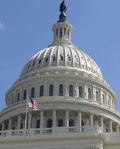
Congress left Washington for the annual August recess, but not before completing negotiations on a budget deal that lifts the debt ceiling and sets new spending limits for fiscal years 2020 and 2021. This averts severe spending cuts and suspends the debt limit until July 31, 2021. Under this deal, non-defense discretionary funding (funding for CDC, NIH and USAID fall under this) would be increased by $24.5 billion over current levels to $621.5 billion, with another $8 billion included in the Overseas Contingency Operations (OCO) account for FY 2020 and 2021, in line with current levels. Non-defense discretionary spending will increase to $626.5 billion in FY 2021. Defense funding will also increase under the new budget caps deal.
Despite the significant progress marked by passage of this deal, Congress still has significant work to do when they return in September. While the House has passed spending bills for FY 2020, much of the work will need to be revisited in light of the new spending limits. Meanwhile, the Senate was waiting until a budget deal could be reached to begin writing the twelve spending bills. Therefore, a short-term continuing resolution (CR) is likely to extend current funding to avoid a government shutdown. When elections are on the horizon, there is little appetite for media coverage of a shutdown.
Also, for the second year in a row, the Administration attempted to put a hold on remaining foreign aid funding for FY 2019 by ordering the Office of Management and Budget (OMB) to review all State Department and USAID unobligated resources of foreign aid. The announced remaining funds would have been frozen and prohibited from being distributed pending the review. The frozen funds included development assistance, global health, contributions to international organization, international narcotics control and peacekeeping activities. According to a USAID official, this could be between $2 billion and $4 billion.
After pushback from Congress and the State Department, the OMB lifted the spending freeze on Friday but imposed the spending cap of 2 percent per day. It is expected that the White House will ask Congress by August 20 to cancel the unspent money in a process known as rescission. With Congress on recess until early September, it’s uncertain if lawmakers could organize a response in time.
On the Ebola front, when the Senate returns September 9 it could also begin considering legislation to provide relief for the Democratic Republic of Congo’s Ebola outbreak. Under S. 1340, USAID would be required to provide foreign aid to the Congo and others at risk and would include “multi-sectoral, non-humanitarian and non-trade related” support. In addition, the bill would authorize amounts necessary to effectively respond to the outbreak. Any activities to improve access to affected communities would have to be prioritized. The Senate has agreed to consideration by September 26.